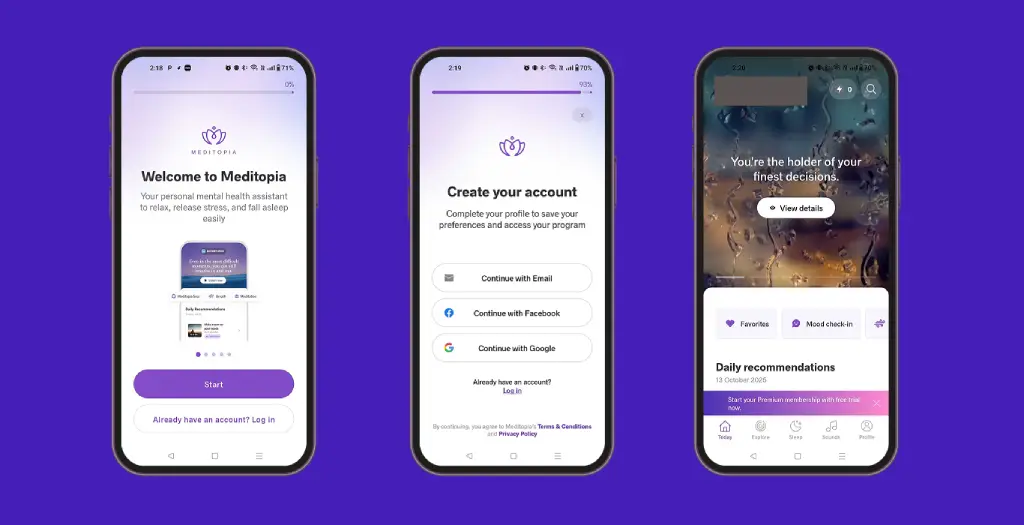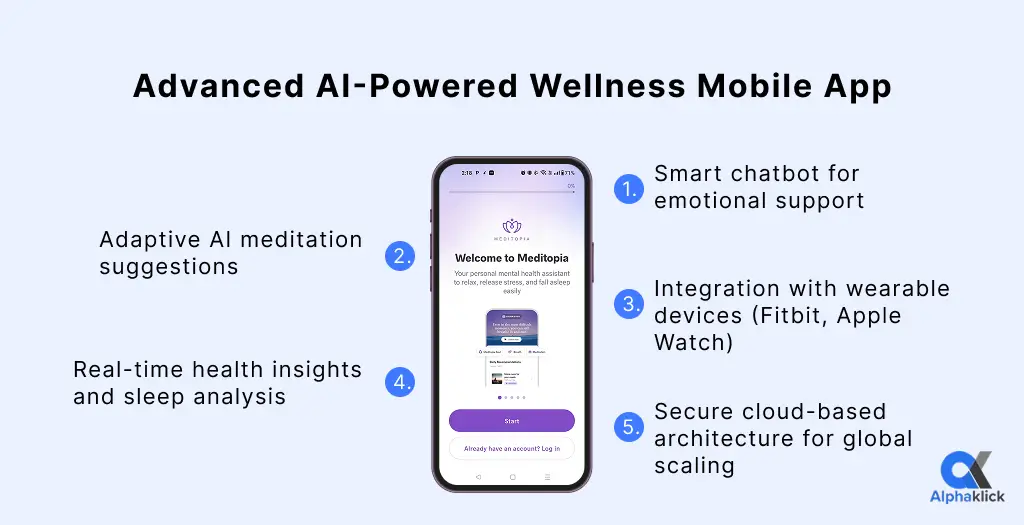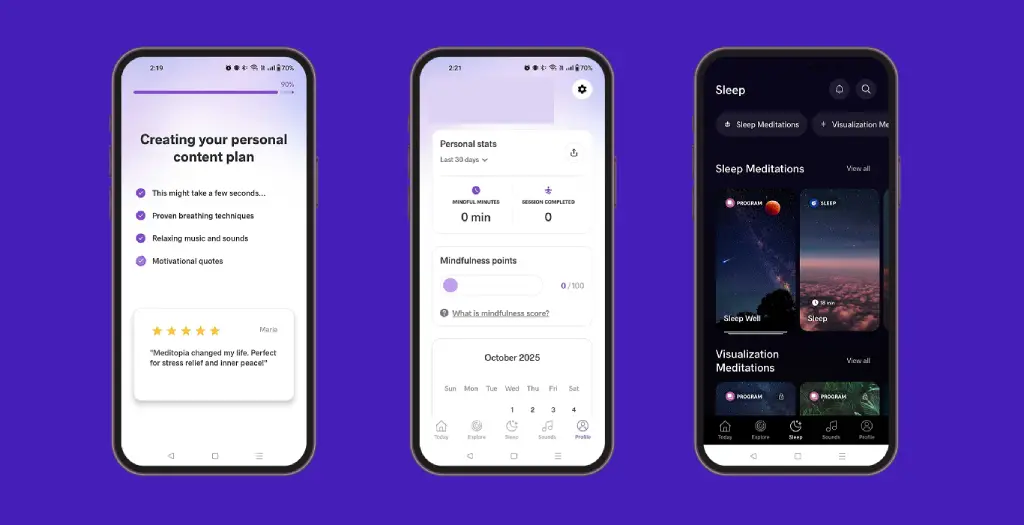Table of Contents
ToggleBuilding peace isn’t free; even calm has a cost.
In 2026, the cost to build a mobile app like Meditopia typically ranges between $25,000 and $100,000, depending on the depth of features, personalization, and design experience.
There’s something beautiful about how silence has gone digital.
When I first started working with wellness brands, I realized most founders weren’t chasing downloads; they were trying to build peaceful experiences people could carry in their pockets.
And somewhere during every meeting, the same question would surface with a curious smile:
“So… what does it actually cost to build something like Meditopia?”
That question isn’t just about money — it’s about the value of calm, the cost of empathy, and the effort behind a design that feels like therapy.
In this article, I will walk you through what really goes into a mental wellness mobile app — the true mental health mobile app development cost in 2026, a realistic wellness mobile app development pricing breakdown, and how you can plan your cost to build a mobile app like Meditopia without losing the serenity that makes it meaningful.
If you are still exploring the development journey, check out our guide on building a mental health mobile app like Meditopia for step-by-step insights.
Cost to Build a Meditopia-Like Mobile App

So, what does building calm actually cost?
From what I have seen across wellness projects, pricing depends less on “how big” the mobile app is and more on how deeply it connects with users.
Mobile apps that focus on guided sessions and journaling are far lighter than those using AI-based mood tracking or sleep analytics.
Here’s a quick snapshot of what founders typically invest:
| App Type | Estimated Cost (USD) | Timeline |
| Starter (MVP) | $25,000 – $40,000 | 3–4 months |
| Growth-Stage | $45,000 – $60,000 | 5–8 months |
| Advanced + AI-Driven | $65,000 – $100,000 + | 8–12 months |
In my experience, most wellness brands start comfortably in the $50K–$80K range, enough to deliver a personalized, secure, and visually calming experience that users love.
If you build with an expert mobile app team in India, your cost to develop a mental wellness mobile app can drop by up to 60%, while still matching international design and performance standards.
Feature-Wise Cost Breakdown of a Meditopia-Like Mobile App
When it comes to building a wellness mobile app, every additional feature adds both depth and dollars to your project. Based on my experience working with mindfulness and self-care startups, here’s how I usually classify the mobile app development journey, from the simplest MVP to an advanced AI-powered experience.
1. Basic Meditation App (MVP): $10,000 to $25,000
This is your starting point: clean, minimal, and focused on the essentials. The goal here is to test your idea, build a small user base, and validate the concept.
Typical features include:
- User login and onboarding
- Basic meditation or audio library
- Search and category filters
- Playlists for relaxation or focus
- Offline playback for key sessions
It’s ideal for early-stage founders who want to launch quickly without heavy AI or analytics. Think of it as the first step toward building your digital sanctuary.
2. Growth-Level App (Personalized Experience): $25,000 to $60,000
This is where your app starts feeling more like Meditopia. You begin adding emotional intelligence and personalization, features that connect with users on a deeper level.
Typical features include:
- AI-driven content recommendations
- Mood tracking and emotional journaling
- Sleep stories and an ambient sound library
- Progress tracking dashboard
- Notifications for daily mindfulness goals
In my experience, this is the sweet spot for most wellness startups. The cost to develop a mental wellness mobile app at this level is higher, but it’s also where user engagement skyrockets.
3. Advanced AI-Powered Wellness Mobile App: $65,000 to $100,000+
At this stage, you’re building a full-scale AI mental wellness mobile app, something capable of analyzing user behavior, emotions, and preferences to offer personalized therapy or meditation paths.
Typical features include:
- Smart chatbot for emotional support
- Adaptive AI meditation suggestions
- Integration with wearable devices (Fitbit, Apple Watch)
- Real-time health insights and sleep analysis
- Secure cloud-based architecture for global scaling
This version is best suited for established wellness brands or funded startups ready to compete with top-tier mobile apps like Meditopia and Calm. It takes more time and investment, but it also creates a platform that truly understands the user’s mental state.
In short, whether you are starting small or going all in, remember this: every feature should serve calm, not complexity. The right combination of empathy, design, and technology determines both the user experience and your final mental health mobile app development cost in 2026.

Platform-Wise Cost: iOS vs Android vs Cross-Platform
Once you have defined your features, the next big question is, where should you launch first?
Your choice of platform can significantly influence your overall budget and timeline. Over the years, I have seen how this decision can make or break early-stage wellness mobile apps.
Let’s look at the realistic ranges for 2026:
| Platform | Estimated Development Cost (USD) | Best For |
| iOS | $25,000 – $70,000 | Premium audiences and Apple ecosystem users |
| Android | $20,000 – $60,000 | Global reach and emerging markets |
| Cross-Platform (Flutter / React Native) | $30,000 – $80,000 | Budget-conscious startups wanting both platforms |
If your audience is concentrated in the U.S., U.K., or Europe, iOS development often delivers higher retention and in-app purchases, though it comes at a slightly higher price point.
On the other hand, Android apps dominate in markets like India, Southeast Asia, and Latin America, giving you a broader audience at a lower cost.
From my experience, most wellness founders prefer a cross-platform approach, especially during early launches. Using frameworks like Flutter or React Native, you can build once and deploy on both iOS and Android, reducing mobile app development time by up to 40%.
This approach keeps your cross-platform meditation mobile app cost between $30,000 and $80,000, while still ensuring smooth performance and a native-like user experience. For startups validating ideas or testing user traction, it’s the smartest way to grow without overextending your budget.
For a detailed comparison of advanced features and pricing, explore our complete guide on AI-powered mental health mobile app development.
Design, Branding & UI/UX Cost
Design is where the soul of your wellness mobile app takes shape. It’s what turns a set of features into an experience that feels calm, safe, and inviting. A mental wellness mobile app should breathe simplicity, guiding users without noise or distraction.
Designers focus on soothing color palettes, soft transitions, natural motion, and typography that feels light and comforting. Add minimal layouts and intuitive navigation, and the mobile app itself starts to feel like meditation.
Estimated Cost: $5,000 – $20,000
From my experience, this is one area where every dollar matters. A mindful design doesn’t just attract users, it keeps them emotionally connected, which is priceless for long-term engagement.

Backend, Database & Cloud Infrastructure
If your mental health mobile app’s design is its face, the backend is its heartbeat. It powers everything, user logins, streaming, journaling, and AI-driven personalization, all while keeping data secure and performance smooth.
Most mental wellness mobile apps rely on Firebase or AWS for hosting, Node.js + MongoDB for scalable architecture, and integrations like Stripe or Twilio for payments and alerts.
Average Range: $8,000 – $25,000
In my projects, I have seen strong backend systems save founders countless hours later. It’s the backbone of any reliable wellness product, and a critical part of the healthcare mobile app cost breakdown.
You can also explore our breakdown of healthcare mobile app development cost in India to see how pricing trends compare across wellness categories.
AI & Machine Learning Implementation
AI is what brings emotional depth to your mobile app. It allows the platform to understand users, tracking their moods, recommending content, and offering a more personal experience.
Typical AI features include chatbots, mood tracking, personalized meditation suggestions, and adaptive learning. These capabilities usually add $15,000 – $40,000 to the total AI mental wellness mobile app price.
Yes, it raises the budget, but in my experience, AI turns mobile apps into companions. It’s what keeps users engaged and makes wellness feel human, not mechanical.
Curious how AI transforms other sectors, too? Read more about how AI benefits mobile apps across industries and why it’s redefining digital experiences.
Maintenance & Post-Launch Support
Building the mobile app is just the beginning; maintaining it is what sustains growth. Regular updates, hosting, content uploads, and performance optimization all ensure your mobile app keeps running smoothly.
Ongoing Cost: $1,500 – $3,000/month
Founders often overlook this stage, but it’s essential. A consistently updated mobile app not only performs better but also earns user trust, something that’s invaluable in the mental health space.
In-House vs Outsourcing: Why India Leads in Affordable Mobile App Development
When building a wellness mobile app, one of the biggest choices is whether to hire an in-house team or outsource the work.
Both have value, but the difference in cost and flexibility can be dramatic, especially for startups.
| Option | Average Cost (USD) | Pros |
| In-House (US/EU) | $100,000 – $250,000 | Full control, on-site coordination |
| Outsourced (India) | $30,000 – $80,000 | Cost-effective, faster delivery, expert teams |
In my experience, partnering with a mobile app development company in India offers the best balance of affordability and expertise. You get skilled mobile app developers, experienced designers, and shorter build cycles, without sacrificing quality.
At AlphaKlick Solutions, we use Flutter, React Native, and AI-driven frameworks to help brands cut their mobile app development cost in India by nearly 60% while maintaining global design and performance standards. It’s not just about saving money; it’s about scaling smart.
Looking for the right tech partner? Here’s a curated list of the top mobile app development companies in India known for quality and affordability.
Monetization Models for Mental Health Mobile Apps
Building the mobile app is only half the journey; keeping it sustainable is where the real challenge (and opportunity) lies. From my experience working with wellness startups, I have learned that the best mental health mobile apps don’t just focus on downloads; they build consistent revenue streams that support long-term growth and content expansion.
Here are a few proven models that work beautifully in the wellness space:
1. Subscription Plans (Most Reliable)
Offer users monthly or yearly access to premium content, such as guided meditations, sleep programs, or therapist-led sessions. It’s predictable, scalable, and ideal for building loyal communities.
Revenue Potential: High, recurring, stable income.
2. Freemium Model (Best for Growth)
This model gives users a taste of mindfulness for free while unlocking premium content or advanced features through upgrades.
Best Strategy: Use free sessions to build trust; offer deeper experiences behind a subscription paywall.
3. In-App Purchases (Content-Driven Revenue)
Sell one-time purchases like themed meditation packs, soothing music collections, or personalized therapy tracks. Great for users who prefer flexibility over commitment.
4. Corporate Wellness Programs (B2B Expansion)
More companies are investing in mental health support for employees. Partnering with organizations for bulk subscriptions can open new, recurring revenue channels.
5. Sponsorships & Partnerships
Collaborate with wellness brands, nutrition companies, or fitness platforms for co-branded experiences or content collaborations.
In my projects, the combination of freemium + subscription has consistently proven most effective; it invites new users while keeping serious ones committed.
When planning your wellness mobile app development pricing, make sure your revenue model supports both short-term traction and long-term sustainability. After all, the calm you create deserves to grow, not fade.
How AlphaKlick Builds Cost-Effective Wellness Mobile Apps
At AlphaKlick Solutions, we believe calm can be built with code when purpose meets precision. As a leading mobile app development company in India, we focus on creating digital wellness experiences that are meaningful, scalable, and affordable.
Here’s how we make that balance work:
- Smart Planning: We start with clarity, defining your vision, audience, and wellness goals before mobile app development begins.
- Cross-Platform Builds: Using Flutter and React Native, we cut costs and timelines by up to 40% while keeping top-tier performance.
- AI With Purpose: We integrate AI features only where they add empathy and personalization, not complexity.
- Transparent Pricing: Our wellness mobile app development pricing model ensures you know exactly where every dollar goes.
For us, success isn’t just about downloads, it’s about impact. Every mobile app we create aims to help users feel calmer, more mindful, and more connected.
Book a free consultation call with AlphaKlick Solutions today, and let’s plan your journey to build a cost-effective, high-impact mental wellness mobile app.
FAQs: Cost to Develop a Mental Health Mobile App in 2026
1. What’s the minimum cost to build a mobile app like Meditopia?
A basic MVP with essential meditation and tracking features can start at $25,000 – $40,000.
2. How does AI impact mobile app cost?
Adding AI chatbots or personalization modules can increase your AI mental wellness mobile app price by 20–30%.
3. Is cross-platform mobile app development cheaper?
Yes, the cross-platform meditation mobile app cost is lower since you only build once for both Android and iOS.
4. Why is mobile app development in India more affordable?
Lower operational costs and skilled mobile app developer availability make the mobile app development cost in India 2026 nearly half compared to Western countries.
5. How much does it cost to maintain such a mobile app yearly?
Expect around $15,000 – $30,000 annually, depending on updates and user load.

